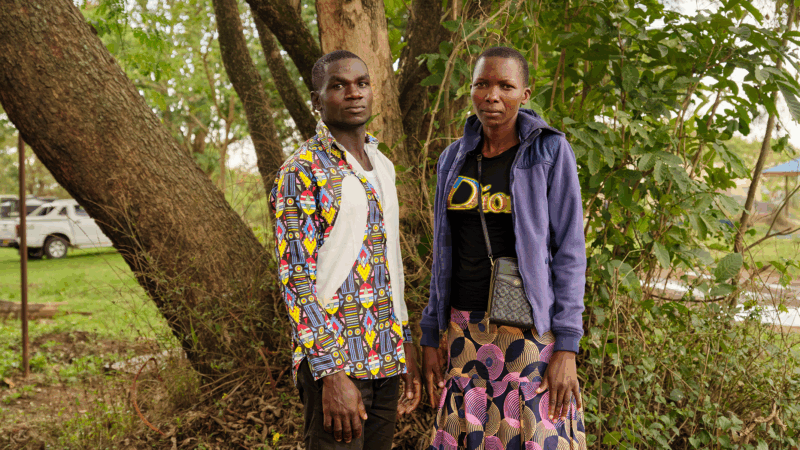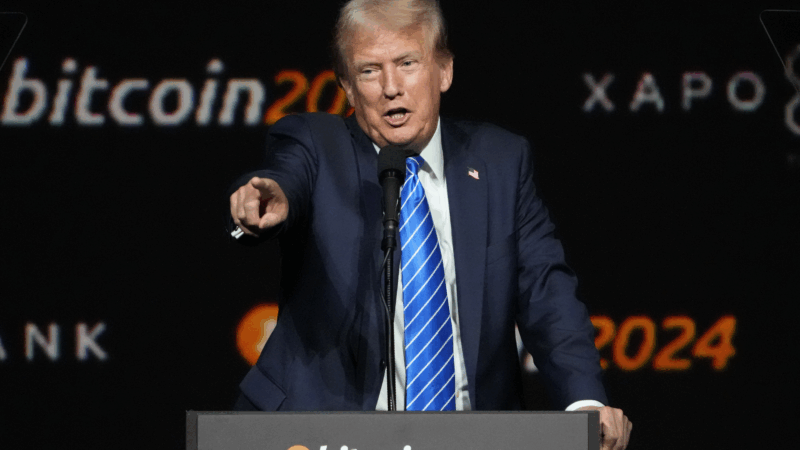Love, drugs and condoms: Couples with different HIV status face a new reality
Let’s say you fall in love with someone harboring a deadly — and highly infectious — virus. And you think … is it crazy to get married?
Sometimes love conquers all — with the help of modern medicine.
That’s the story of serodiscordant couples — the term used when one partner is HIV positive and the other is HIV negative.
Robert Ochweda and Millicent Akoth of Kenya are one such couple. She is HIV positive — she caught the virus from her former husband. He is a fisherman who is HIV negative. After the two of them fell in love, he says he was afraid to marry her lest he contract the virus.
He was able to overcome his fears.
“I have been able to stay safe by using condoms and PrEP,” Ochweda explains, referring to a pill that prevents infection. And The Centers for Disease Control and Prevention writes: “Most condoms are highly effective in preventing HIV.”
His wife takes antiretroviral pills that reduce her viral load, so she does not face the risk of death from AIDS. Those pills also reduce the risk that she will infect her husband.
This year, couples in this category are especially anxious. They say that, in the wake of the Trump administration’s dramatic foreign aid cuts and dismantling of USAID, the agency that supported health-related programs, it’s become harder to find the pills and condoms that keep them safe.

Caleb Ochieng, who is HIV negative, has been married to Diana Odhiambo, who is HIV positive, for eight years.
Ochieng learned of Odhiambo’s HIV status when they went to do an HIV test as they made plans to tie the knot after several years of cohabiting. She believes she contracted the disease from a previous relationship.
“We were shocked because at that time we had two children and wanted others. We were advised on preventive measures like condom use and voluntary male circumcision as a way of preventing HIV infection,” he says.
“I wondered how we would manage,” he recalls. “It’s not been easy but with love, we have been taking care of ourselves.”
Odhiambo takes pills to suppress the virus; he takes pre-exposure prophylaxis (PrEP) to stay safe. He is tested for HIV every three months.
Taking these precautions, the couple has had two children who are HIV negative. After counseling, Odhiambo has become a peer educator who talks to other couples in the same situation. The partner who is positive, he reflects, “has a lot of emotions. AS a partner, you should be there for them and support them well.”
On a recent visit to the clinic where he picks up his PrEP drugs, he says, “I was told the supply that was available has been reserved for pregnant women. I traveled to neighboring Busia county and managed to get a small dose that could last a month and a half.”
His experience echoes a memo from the State Department that NPR obtained, stating that if a clinic receives funding through the U.S. program PEPFAR, this preventative medication can “only” be given to “pregnant and breastfeeding women” during the 90-day freeze on foreign aid that the Trump administration instituted — and that is still in effect.
A senior health official with the Kenyan Ministry of Health told NPR that clinics have been rationing medications and other supplies because of the uncertainties about donor funds.
“We acquire most of the HIV medication through partners and donors. The exit of U.S. funding means that there is a gap, and until that gap is filled, there is always bound to be friction but the government has done everything to keep operations going,” says the official, who asked not to be identified by name because he did not have permission to speak to the press.
Joywine Adek, a programs officer at Mildmay Kenya, an organization that supports HIV patients, is seeing this gap.
Mildmay Kenya is among the organizations that was receiving funding from the U.S. government to support HIV interventions in Kenya, including screening services, distribution of antiretroviral drugs and condoms, and counseling for serodiscordant couples.
“In the current grant that is available after the reduction in funding, there is no support for discordant couples,” Adek says, adding that the charity has had to halt many of its services because of the loss of U.S. aid.
“We are trying to sort this out by doing what we call integration of HIV care into routine health care,” says Fredrick Oluoch, the director of public health in Kenya’s Kisumu County.
The lack of condoms is evident. This reporter saw empty dispensers where co Kndoms were once stocked and made available in clinics.

And even though condoms are inexpensive — as little as $1 or $2 each in the U.S., even less in Kenya — that price could still be daunting in a country where a third of the population lives below the poverty line of about $2 a day in income.
Kenya has previously reported that the supply of condoms was not equal to the demand. But this year, officials say, things are worse than ever in the wake of the U.S. foreign aid shakeup, which has affected some of the suppliers, like the United Nations Population Fund (UNFPA).
In a statement to NPR, UNFPA noted: “Kenya has historically relied heavily on USAID for its free condom distribution programs. Kenya’s annual condom requirement is estimated at 400–450 million units. Condom procurement by UNFPA has been affected indirectly — but nonetheless significantly – by U.S. funding cuts. While UNFPA continues its role in condom programming through funding from other global partners, the U.S. stop work order has contributed to shortfalls in supply, putting more pressure on UNFPA and other providers. Some 9.8 million UNFPA-procured condoms were received at the Kenya Central Stores on August 13, 2025, but funding restrictions from the U.S. and other donors mean there is uncertainty as to whether UNFPA will be able to meet projected condom procurement needs for 2026 and beyond.”
NPR asked the State Department to respond to these points about U.S. funding and free condom programs but did not receive a response.
The result of this altered aid landscape is that partners with different HIV status are living with newfound uncertainty.

Erastus Ng’uono was born with HIV positive status. When he met Winnie Auma Miyare and wanted to start a relationship with her, he asked her if she could love someone who is HIV positive and using ARVs. A few days later, he told her about his HIV status.
At first she did not want to have anything to do with him. But when he explained how medications could help her ward off infection, she changed her mind. She takes PrEP pills. They have four children who are all HIV negative. Their youngest is six months old.
The news of U.S. aid cuts that could affect the strategies they use has hit them hard. “I encouraged him to have courage and not to worry,” she says. “I know the government will intervene.”
“I was very afraid,” he says. “I even prayed over it and I know God will see us through.”
Still he worries. “The shortage of the drugs and condoms is a major concern for us and the government is yet to address our concerns,” says Ng’uono. “I don’t know what the future holds.”
Viola Kosome is a Kenyan journalist. See more of photojournalist Julia Gunther’s work on her website or follow her on Instagram: @juliagunther_photography.
In this Icelandic drama, a couple quietly drifts apart
Icelandic director Hlynur Pálmason weaves scenes of quiet domestic life against the backdrop of an arresting landscape in his newest film.
After the Fall: How Olympic figure skaters soar after stumbling on the ice
Olympic figure skating is often seems to take athletes to the very edge of perfection, but even the greatest stumble and fall. How do they pull themselves together again on the biggest world stage? Toughness, poise and practice.
They’re cured of leprosy. Why do they still live in leprosy colonies?
Leprosy is one of the least contagious diseases around — and perhaps one of the most misunderstood. The colonies are relics of a not-too-distant past when those diagnosed with leprosy were exiled.
This season, ‘The Pitt’ is about what doesn’t happen in one day
The first season of The Pitt was about acute problems. The second is about chronic ones.
Lindsey Vonn is set to ski the Olympic downhill race with a torn ACL. How?
An ACL tear would keep almost any other athlete from competing -- but not Lindsey Vonn, the 41-year-old superstar skier who is determined to cap off an incredible comeback from retirement with one last shot at an Olympic medal.
Trump promised a crypto revolution. So why is bitcoin crashing?
Trump got elected promising to usher in a crypto revolution. More than a year later, bitcoin's price has come tumbling down. What happened?







